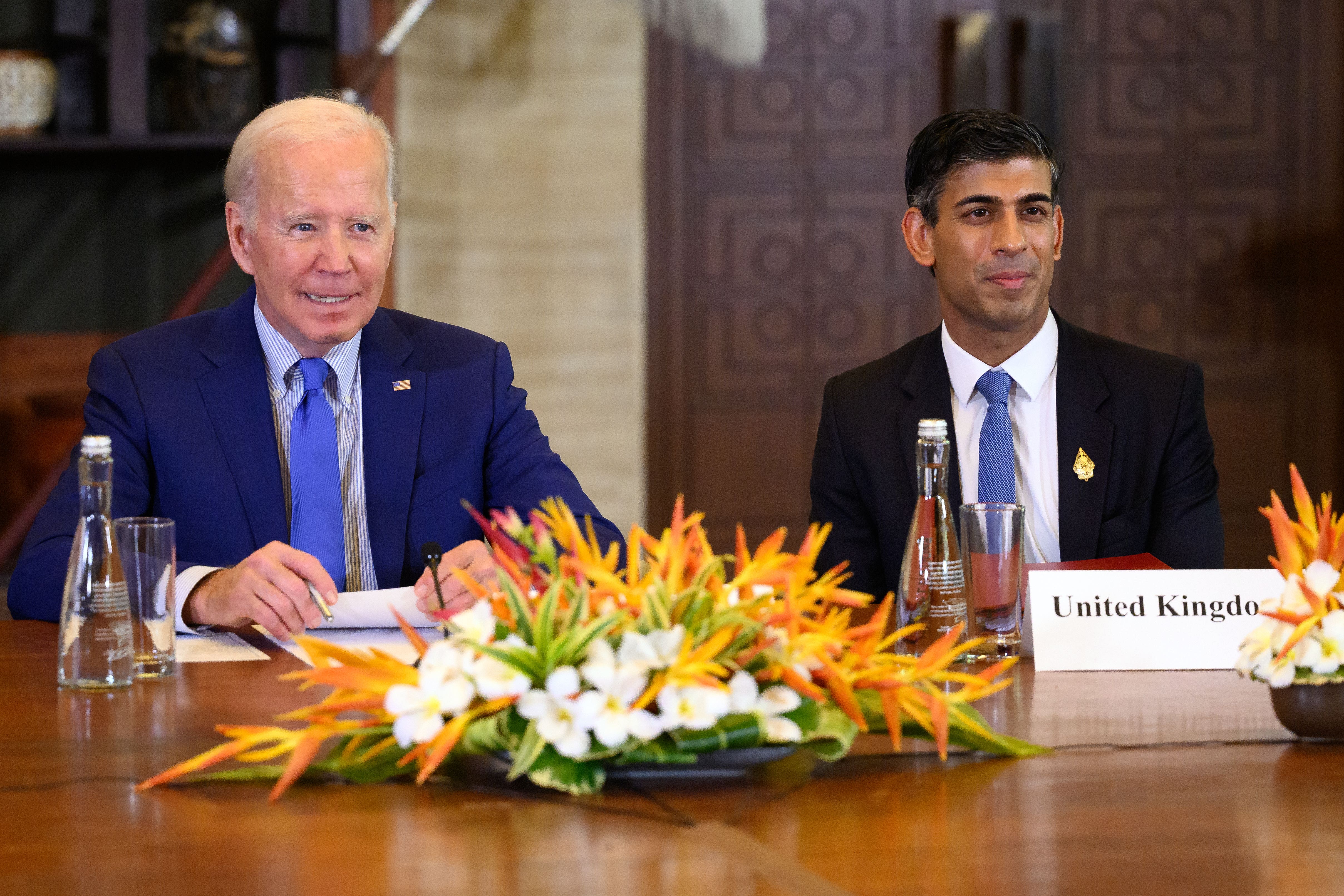Sunak to urge Nato allies to up defence spending amid ‘unprecedented’ challenges
The Prime Minister will host US president Joe Biden in London before meeting world leaders in Lithuania.

Your support helps us to tell the story
From reproductive rights to climate change to Big Tech, The Independent is on the ground when the story is developing. Whether it's investigating the financials of Elon Musk's pro-Trump PAC or producing our latest documentary, 'The A Word', which shines a light on the American women fighting for reproductive rights, we know how important it is to parse out the facts from the messaging.
At such a critical moment in US history, we need reporters on the ground. Your donation allows us to keep sending journalists to speak to both sides of the story.
The Independent is trusted by Americans across the entire political spectrum. And unlike many other quality news outlets, we choose not to lock Americans out of our reporting and analysis with paywalls. We believe quality journalism should be available to everyone, paid for by those who can afford it.
Your support makes all the difference.Rishi Sunak will use the Nato summit in Lithuania to urge allies to increase their defence spending as he warns they face “unprecedented” security challenges.
The Prime Minister will meet with leaders in Lithuania on Tuesday for talks that will feature support for Ukraine and its future membership of the defensive alliance.
He will first host Joe Biden in the UK after the US president committed to sending Kyiv cluster munitions, despite many Nato allies prohibiting their use.
Mr Sunak said Britain “discourages” the weapons as one of the 123 signatories of a convention banning the bombs for their devastating impact on civilians.
The White House said Mr Biden will “compare notes” with Mr Sunak on the Ukrainian counteroffensive against Russia.
The president will also meet the King in Windsor Castle.
At the summit in Vilnius, Downing Street said that Mr Sunak will ask allies to up their defence spending to ensure it is prepared for future threats.
In a statement, the Prime Minister said: “As we face new and unprecedented challenges to our physical and economic security, our alliances are more important than ever.
“The UK is Europe’s leading Nato ally, we are the United States’ most important trade, defence and diplomatic partner, and we are at the forefront of providing Ukraine with the support they need to succeed on the battlefield.
“We have forged and invested in these alliances because we know they are the foundation of our strength and security. And I will continue to lead a United Kingdom which puts our international relationships at the heart of delivering for the British people.”
The UK is among a minority of Nato members that meets the alliance’s commitment to spend at least 2% of national income on defence.
Estimates for last year had France, Germany and Spain as included in those not meeting the target.
Mr Biden has said it was a “difficult decision” to send cluster bombs to Ukraine and sought to justify the move as needed to fortify Kyiv’s depleting ammunition stocks.
But Mr Sunak chose not to express support for the move during a by-election campaign stop to Selby, pointing to the UK’s commitment to the Convention on Cluster Munitions.
“Well, the UK is signatory to a convention which prohibits the production or use of cluster munitions and discourages their use,” he told broadcasters.
“We will continue to do our part to support Ukraine against Russia’s illegal and unprovoked invasion, but we’ve done that by providing heavy battle tanks and most recently long-range weapons, and hopefully all countries can continue to support Ukraine.
“Russia’s act of barbarism is causing untold suffering to millions of people.
“It’s right that we collectively stand up to it and I’ll be heading off to the Nato summit next week in Vilnius, where we will be discussing exactly this with our allies how we can strengthen our support for Ukraine.”
The weapons deploy a large number of bomblets across a wide area.
Unexploded bomblets can continue to pose a threat to civilians long after conflicts end.
The Convention on Cluster Munitions, which prohibits their use or stockpiling because of their indiscriminate effect on civilian populations.
The US, Ukraine and Russia are not signatories.
Both Moscow and Kyiv have used cluster munitions so far in the war.